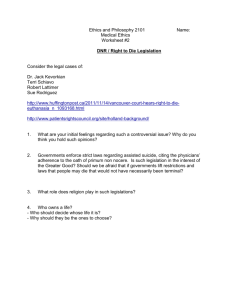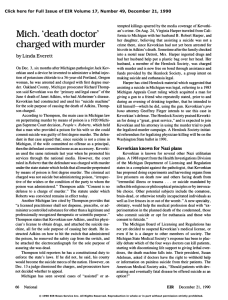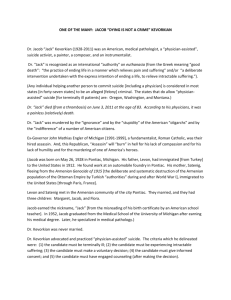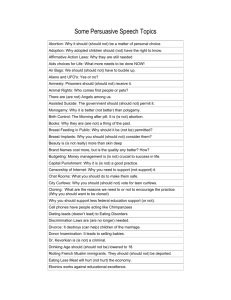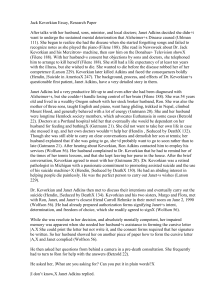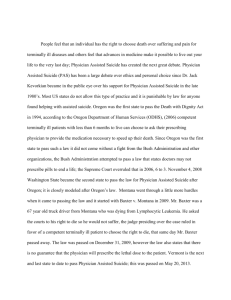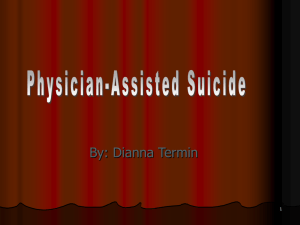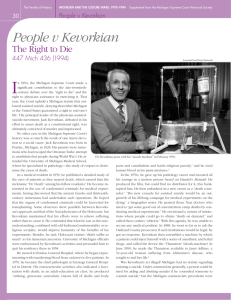Religious & Cultural Beliefs Student Notes
advertisement
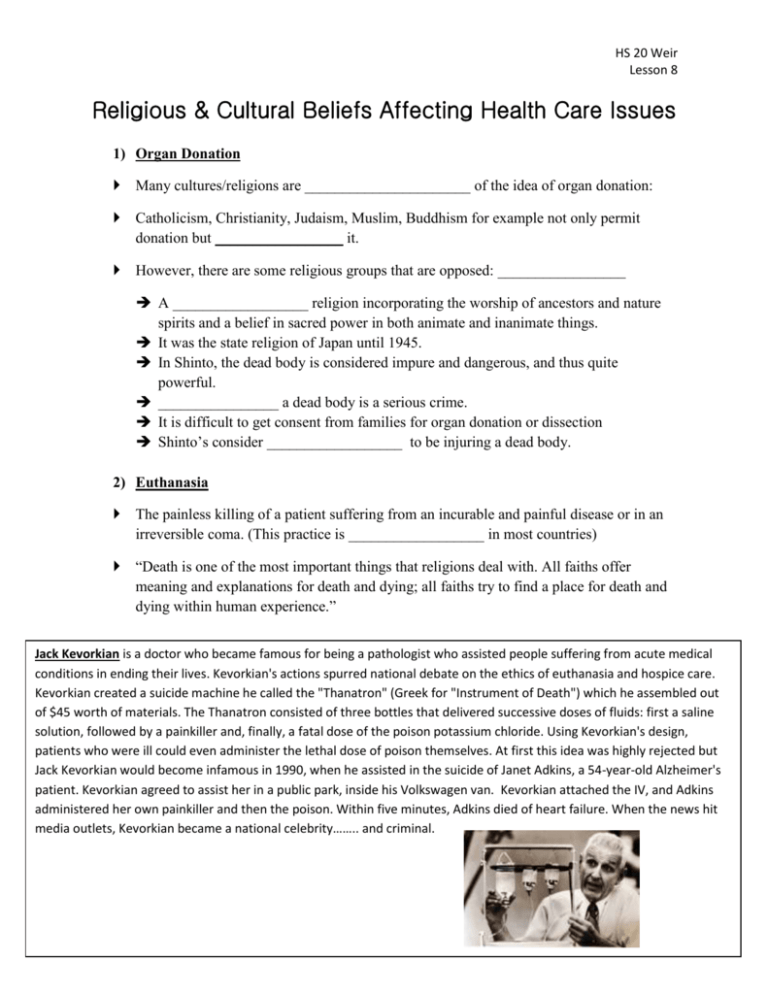
HS 20 Weir Lesson 8 Religious & Cultural Beliefs Affecting Health Care Issues 1) Organ Donation Many cultures/religions are ______________________ of the idea of organ donation: Catholicism, Christianity, Judaism, Muslim, Buddhism for example not only permit donation but _________________ it. However, there are some religious groups that are opposed: _________________ A __________________ religion incorporating the worship of ancestors and nature spirits and a belief in sacred power in both animate and inanimate things. It was the state religion of Japan until 1945. In Shinto, the dead body is considered impure and dangerous, and thus quite powerful. ________________ a dead body is a serious crime. It is difficult to get consent from families for organ donation or dissection Shinto’s consider __________________ to be injuring a dead body. 2) Euthanasia The painless killing of a patient suffering from an incurable and painful disease or in an irreversible coma. (This practice is __________________ in most countries) “Death is one of the most important things that religions deal with. All faiths offer meaning and explanations for death and dying; all faiths try to find a place for death and dying within human experience.” Jack Kevorkian is a doctor who became famous for being a pathologist who assisted people suffering from acute medical conditions in ending their lives. Kevorkian's actions spurred national debate on the ethics of euthanasia and hospice care. Kevorkian created a suicide machine he called the "Thanatron" (Greek for "Instrument of Death") which he assembled out of $45 worth of materials. The Thanatron consisted of three bottles that delivered successive doses of fluids: first a saline solution, followed by a painkiller and, finally, a fatal dose of the poison potassium chloride. Using Kevorkian's design, patients who were ill could even administer the lethal dose of poison themselves. At first this idea was highly rejected but Jack Kevorkian would become infamous in 1990, when he assisted in the suicide of Janet Adkins, a 54-year-old Alzheimer's patient. Kevorkian agreed to assist her in a public park, inside his Volkswagen van. Kevorkian attached the IV, and Adkins administered her own painkiller and then the poison. Within five minutes, Adkins died of heart failure. When the news hit media outlets, Kevorkian became a national celebrity…….. and criminal. The State of Michigan immediately charged Kevorkian with Adkins' murder. The case was later dismissed, however, due to Michigan's indecisive stance on assisted suicide. In 1991, Michigan suspended Jack Kevorkian's medical HS 20 Weir Lesson 8 license but this didn't stop the doctor from continuing to assist with suicides. Unable to gather the medications needed to use the Thanatron, Kevorkian assembled a new machine, called the Mercitron. This machine delivered carbon monoxide through a gas mask. The following year, the Michigan Legislature passed a bill outlawing assisted suicide. Kevorkian was jailed twice that year. He was bailed out by successfully arguing that a person may not be found guilty of criminally assisting a suicide if they administered medication with the "intent to relieve pain and suffering," even it if did increase the risk of death. In 1998, the Michigan legislature enacted a law making assisted suicide a felony punishable by a maximum five-year prison sentence or a $10,000 fine. They also closed the loophole that allowed for Kevorkian's previous acquittals. Yet Kevorkian continued to assist patients. He even let the popular TV show “60 Minutes” show a recorded tape of him performing assisted suicide on a patient. Kevorkian spoke to 60 Minutes reporters and dared the courts to pursue him legally. On March 26, 1999 Jack Kevorkian was convicted of second-degree murder and the illegal delivery of a controlled substance. That April, he was sentenced to 25 years in prison with the possibility of parole. During the next three years, Kevorkian attempted to pursue the conviction in appeals court. His request was refused. Lawyers representing Kevorkian sought to bring the case to the U.S. Supreme Court, but that request was also declined. On June 1, 2007, after serving a little more than eight years of his sentence, Kevorkian was released from prison on good behavior. The former doctor also promised not to assist in any more suicides. In 2008, Kevorkian announced plans to run as an independent candidate for a seat in U.S. Congress representing Michigan. Though he didn't win the election, he did earn 2.6% of the vote. There is a movie called “You Don’t Know Jack” profiling his life. In 2011, at the age of 83, Jack Kevorkian died at Beaumont Hospital in Royal Oak, Michigan. http://www.biography.com/people/jack-kevorkian-9364141 Buddhism Christianity _________________ Hinduism Islam Judaism Not supported ; life is given by God The Roman Catholic church regards euthanasia as morally wrong There are two Hindu views on euthanasia: a) By helping to end a painful life a person is performing a ______________________ b) Causes the soul and body to be separated at an unnatural time. The result will damage the _____________ of both doctor and patient. Euthanasia is not supported. However, doctors can stop trying to prolong life in cases where there is no hope of a cure. Jewish law ____________ active euthanasia and regards it as murder. There are no exceptions to this rule HS 20 Weir Lesson 8 3) Autopsy An ______________________________________________ to discover the cause of death or the extent of disease. Most religions and cultures find autopsies ____________________ Certain religions outright _____________ (eg. Islam and Judaism) Christianity, Jehovah’s Witness, Buddhishm Hinduism Have no intrinsic objection to autopsies, but their belief is that all organs must be returned to the body Sikhism Are not opposed to autopsies as long as it does not ___________ the funeral Islam & Judaism Strictly opposed - bodily intrusion violates beliefs about the sanctity of keeping the human body complete 4) Abortion The deliberate ____________________________________________________________ Most often performed during the first ____ weeks of pregnancy. Buddhism Catholicism Islam Would be seen as an act of killing However, if the pregnancy caused a risk to the life of the mother or the baby had a serious disability then an abortion would be seen as the most ethical thing to do Abortion willed either as an end or means, is gravely contrary to the moral law Is considered wrong and is forbidden. But if the motherʼs life is at ________ by pregnancy then abortion is permitted (her life is considered more significant than the embryo’s) HS 20 Weir Lesson 8 Orthodox Judaism ______________ abortion only in cases where continuing with the pregnancy would put the motherʼs life at risk. Judaism 5) Contraception The deliberate use of artificial methods or other techniques to ______________________ The major forms of artificial contraception are barrier methods: Condoms; birth control; male or female sterilization. Some religions do not agree with the use of contraceptives as they believe it should happen ___________________ and not be artificially inhibited. Buddhism - Catholicism Islam Judaism Contraception that prevents fertilization is not ordinarily a problem However if it prevents the development of an already fertilized egg it is _______________________. The Catholic Church sees effective family planning as “reliable knowledge of the cycle of female fertility and a willingness to abstain from sexual union at certain times.” All forms of contraception are ___________________ in special circumstances (if a woman is still breastfeeding) Jewish law states that a ______ may not use any form of contraception. However, there is no mention of females and contraception 6) Cadavers Navajo Muslim Believe that when a person dies, the “good” part of the person leaves with the spirit, while the “evil” part stays with the physical body. Touching the body after death could have harmful consequences Believe that dissecting desecrates the body. After someone dies, it is also important to bury the body as soon as possible; this does not leave time to study the corpse HS 20 Weir Lesson 8 **Note: Navajo = American Indian people of New Mexico and Arizona 7) Blood Transfusions Although _________________________________________________________ to the acceptance of blood transfusions Jehovah’s Witnesses are not allowed. Even if needed to save a person's life, blood transfusions, must not be accepted. Acts 15:29 "That ye abstain from blood..."
